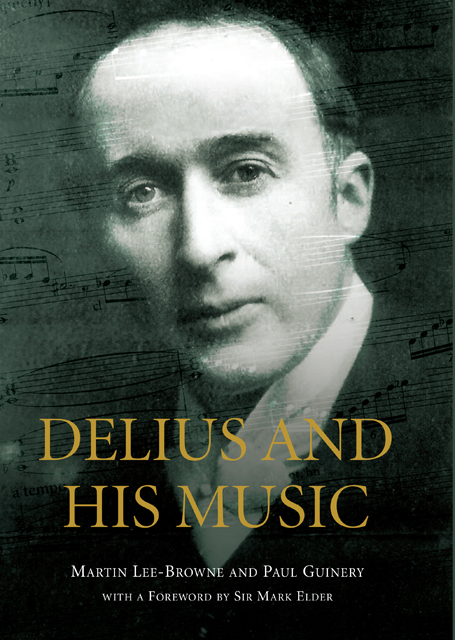Book contents
- Frontmatter
- Contents
- List of Illustrations
- List of Sources and Abbreviations
- Foreword by Sir Mark Elder, CBE
- Preface
- Chapter 1 1862–1888 Youth
- Chapter 2 1888–1892 The Young Composer in Paris
- Chapter 3 1893–1901 Coming to Maturity
- Chapter 4 1902–1905 The Great Noontide and Beecham
- Chapter 5 1906–1910 Acceptance and Friends
- Chapter 6 1911–1914 Inspiration Unabated
- Chapter 7 1915–1918 Winding Down
- Chapter 8 1919–1934 Fenby and the Last Years
- Chapter 9 The Songs
- Chapter 10 1934 and After
- Appendix 1 Delius’s Works in Chronological Order
- Appendix 2 Delius’s Diploma and Reports from The Leipzig Conservatorium
- Appendix 3 Programmes for the 1929 and 1946 Delius Festivals
- Selected Further Reading
- Index
Chapter 4 - 1902–1905 The Great Noontide and Beecham
Published online by Cambridge University Press: 24 February 2023
- Frontmatter
- Contents
- List of Illustrations
- List of Sources and Abbreviations
- Foreword by Sir Mark Elder, CBE
- Preface
- Chapter 1 1862–1888 Youth
- Chapter 2 1888–1892 The Young Composer in Paris
- Chapter 3 1893–1901 Coming to Maturity
- Chapter 4 1902–1905 The Great Noontide and Beecham
- Chapter 5 1906–1910 Acceptance and Friends
- Chapter 6 1911–1914 Inspiration Unabated
- Chapter 7 1915–1918 Winding Down
- Chapter 8 1919–1934 Fenby and the Last Years
- Chapter 9 The Songs
- Chapter 10 1934 and After
- Appendix 1 Delius’s Works in Chronological Order
- Appendix 2 Delius’s Diploma and Reports from The Leipzig Conservatorium
- Appendix 3 Programmes for the 1929 and 1946 Delius Festivals
- Selected Further Reading
- Index
Summary
It seems appropriate now to take stock of what had happened in the rest of the musical world during the time covered by the previous chapters, and of where Delius stood at the end of it.
Although he had been composing seriously for fourteen years, only a few of his works had been heard in public: On the Mountains, Over the Hills, the Légende, the incidental music to Folkeraadet, Mitternachtslied Zarathustras, La Ronde se déroule and Paris, with excerpts from Koanga – all just once each (except for On the Mountains, which had been played twice) and all, except for Paris, at the 1899 St James’s Hall concert. Despite the apparent success of that venture, between then and 1907, when the Piano Concerto was given its second performance, nothing else is known to have been performed anywhere in the United Kingdom. Delius had not yet broken through the barrier of acceptance.
Since the time of Johann Sebastian Bach, music had played a much greater part in everyday German life than it did in England – every town of any size, particularly in the Rhineland and Thuringia, had its director of music, an opera house, an orchestra and choirs – and there was therefore a continual movement of conductors, performers and, consequently, musical news between them. It was accordingly not in the least unusual that Buths moved from Elberfeld to Düsseldorf; or that Cassirer went from Lübeck to Posen, then to Saarbrücken, to Elberfeld, and finally to Berlin. Over a period of years many more German concert-goers got to hear much more new and unfamiliar music – even that of Delius – than was the case in England. By 1902, German audiences had heard, and seemed to have no great difficulty with the extraordinary complexities and new sounds of, the first four of Mahler’s symphonies, all Strauss’s tone poems except for the Sinfonia domestica and Alpensinfonie, the first two of Scriabin’s symphonies and his early piano music, as well as Rachmaninoff’s Symphony no. 1 and Piano Concerto no. 2 – while Schoenberg had started his huge and strange Gurrelieder. Admittedly (apart from Schoenberg) those composers had all had a proper musical education, but nevertheless their music was worlds away from what was concurrently being played in England.
- Type
- Chapter
- Information
- Delius and his Music , pp. 135 - 224Publisher: Boydell & BrewerPrint publication year: 2014



